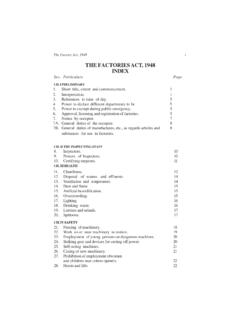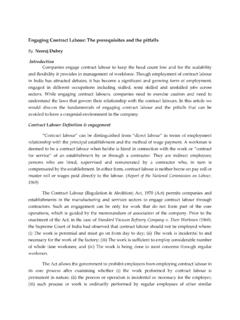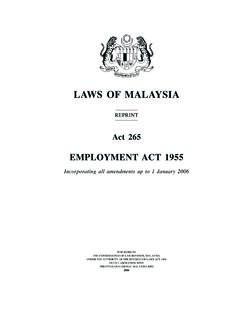Transcription of THE CONTRACT LABOUR (REGULATION AND ABOLITION) …
1 THE CONTRACT LABOUR (REGULATION AND abolition ) central rules , 19711 In exercise of the powers conferred by section 35 of the CONTRACT LABOUR (Regulation and abolition ) Act, 1970 the central Government hereby makes the following rules , the same having been previously published as required by the said section, namely: CHAPTERI rules 1 . Short title and commencement. (1) These rules may be called the CONTRACT LABOUR (Regulation and abolition ) central rules , 1971. (2) They shall come into force on the date2 of their publication in the Official Gazette. 2 . Definitions. In these rules , unless the subject or context otherwise requires, (a) Act means the CONTRACT LABOUR (Regulation and abolition ) Act, 1970; (b) Appellate Officer means the Appellate Officer appointed by the central Government under sub-section (1) of section 15; (c) Board means the central Advisory CONTRACT LABOUR Board constituted under section 3; (d) Chairman means the Chairman of the Board; (e) Committee means a Committee constituted under sub-section (1) of section 5; (f) Form means a form appended to these rules ; (g) Section means a section of the Act.
2 CHAPTERII central BOARD 3. The Board shall consist of the following Members. (a) a Chairman to be appointed by the central Government; (b) the Chief LABOUR Commissioner ( central ) ex-officio; (c) 3[three] persons representing the central Government, to be appointed by that Government from amongst its officials; 1. Vide 191, published in the Gazette of India, Extra., Ft. II, Sec. 3(i), dated 10th February, 1971. 2. Came into force on 10-2-1971 vide 190, published in the Gazette of India, Extra., Pt. II, Sec. 3(i), dated 10th February, 1971. 3. Subs, by 305(E), dated 7th June, 1991. 4. Subs, by 1643, dated 16th October, 1971. 5. Subs, by 598, dated 23rd May, 1973. The CONTRACT LABOUR (Regulation and abolition ) central rules , 1971 (d) 4[two] persons representing the Railways, to be appointed by central Government after consultation with the Railway Board; (e) 5[five] persons, one representing the employers in coal mines, 3[two] representing the employers in other mines and two representing contractors to whom the Act applies, to be appointed by the central Government after consultation with such organisations, if any, of the employers and the contractors as may be recognised by the central Government.
3 (f) 1 [seven] persons, 2[two] representing the employees in the Railways, one representing the employees in coal mines, ^two] representing the employees in other mines and two representing the employees of contractors to whom the Act applies, to be appointed by the central Government after consultation with such organisations, if any, of employees representing the respective interest as may be recognised by the central Government. 4 . Terms of Office. (1) The Chairman of the Board shall hold office as such for a period of three years from the date on which his appointment is first notified in the Official Gazette. (2) Each of the members of the Board, referred to in clauses (c) and (d) of rule 3, shall hold office as such during the pleasure of the President.
4 (3) Each of the members referred to in clauses (e) and (f) of rule 3 shall hold office as such for a period of three years commencing from the date on which his appointment is first notified in the Official Gazette: Provided that where the successor of any such member has not been notified in the Official Gazette on or before the expiry of the said period of three years, such member shall, notwithstanding the expiry of the period of his office, continue to hold such office until the appointment of his successor has been notified in the Official Gazette. (4) If a member is unable to attend a meeting of the Board, the central Government or the body which appointed or nominated him may, by notice in writing signed on its behalf and by such member and addressed to the Chairman of the said Board, nominate a substitute in his place to attend the meeting and such a substitute member shall have all rights of a member in respect of that meeting and any decision taken at the meeting shall be binding on the said body.
5 3[5. Resignation. (1) A member of the Board, not being an ex-officio member, may resign his office by a letter in writing addressed to the central Government. 1. Subs, by 598, dated 23rd May, 1973. 2. Subs, by 1643, dated 16th October, 1971. 3. Subs, by 520, dated 10th May, 1974. (2) The office of such a member shall fall vacant from the date on which his resignation is accepted by the central Government, or on the expiry of thirty days from the date of receipt of the letter of resignation by that Government whichever is earlier.] 6 . Cessation of membership. If any member of the Board, not being an ex- officio member, fails to attend three consecutive meetings of the Board, without obtaining the leave of the Chairman for such absence, he shall cease to be a member of the Board: Provided that the central Government may, if it is satisfied that such member was prevented by sufficient cause from attending three consecutive meetings of the Board, direct that such cessation shall not take place and on such direction being made, such member shall continue to be a member of the Board.
6 7 . Disqualification for membership. (1) A person shall be disqualified for being re-appointed, and for being a member of the Board, (i) if he is of unsound mind and stands so declared by a competent court; or (ii) if he is an undischarged insolvent; or (iii) if he has been or is convicted of an offence which, in the opinion of the central Government, involves moral turpitude. (2) If a question arises as to whether a disqualification has been incurred under sub-rule (1), the central Government shall decide the same. 8 . Removal from membership. The central Government may remove from office any member of the Board, if in its opinion such a member has ceased to represent the interest which he purports to represent on the Board: Provided that no such member shall be removed unless a reasonable opportunity is given to him of making any representation against the proposed action.
7 9 . Vacancy. When a vacancy occurs or is likely to occur in the membership of the Board the Chairman shall submit a report to the central Government and on receipt of such report the central Government shall take steps to fill the vacancy by making an appointment from amongst the category of persons to which the person vacating membership belonged and the person so appointed shall hold office for the remainder of the term of office of the member in whose place he is appointed. 10. Staff. (1) (i) The central Government may appoint one of its officials as Secretary to the Board and appoint such other staff as it may think necessary to enable the Board to carry out its functions. (ii) The salaries and allowances payable to the staff and the other conditions of service of such staff shall be such as may be decided by the central Government.
8 (2) The Secretary (i) shall assist the Chairman in convening meetings of the Board; The CONTRACT LABOUR (Regulation and abolition ) central rules , 1971 (ii) may attend the meetings but shall not be entitled to vote at such meetings; (iii) shall keep a record of the minutes of such meetings; and (iv) shall take necessary measures to carry out the decisions taken at the meetings of the Board. 11. Allowances of members. (1) The travelling allowance of an official member shall be governed by the rules applicable to him for journey performed by him on official duties and shall be paid by the authority paying his salary. (2) The non- official members of the Board shall be paid travelling allowance for attending the meeting of the Board at such rates as are admissible to Grade I Officers of the central Government and daily allowances shall be calculated at the maximum rate admissible to Grade I officers of the central Government in their respective places.
9 12. Disposal of business. Every question which the Board is required to take into consideration shall be considered at a meeting, or, if the Chairman so directs, by sending the necessary papers to every member for opinion, and the question shall be disposed of in accordance with the decision of the majority: Provided that in the case of equality of votes, the Chairman shall have a second or a casting vote. Explanation. Chairman for the purposes of this Rule shall include the Chairman nominated under rule 13 to preside over a meeting. 13. Meetings. (1) The Board shall meet at such places and times as may be specified by the Chairman. (2) The Chairman shall preside over every meeting of the Board at which he is present and in his absence nominate a member of the Board to preside over such meeting.
10 14. Notice of meeting and list of business. (1) Ordinarily seven days notice shall be given to the members of a proposed meeting. (2) No business which is not on the list of business for a meeting shall be considered at that meeting without the permission of the Chairman. 15. Quorum. No business shall be transacted at any meeting unless at least five members are present: Provided that if at any meeting less than five members are present, the Chairman may adjourn the meeting to another date informing members present and given notice to the other members that he proposes to dispose of the business at the adjourned meeting whether there is prescribed quorum or not, and it shall thereupon be lawful for him to dispose of the business at the adjourned meeting irrespective of the number of members attending.









